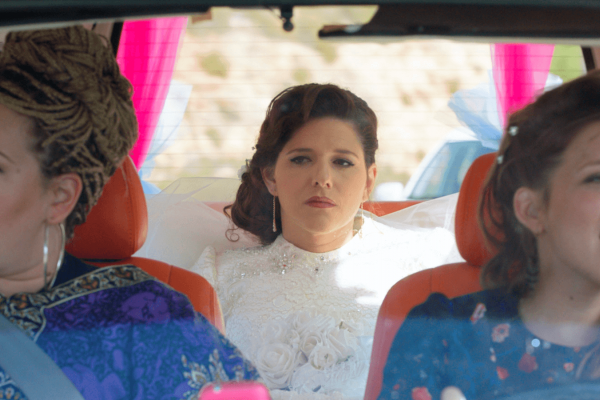In an essay titled “I’m a Christian and I Hate Christian Movies,” critic Alissa Wilkinson addresses the difficult position that believing film critics frequently find ourselves in. We want to champion films that celebrate faith, and invite others to celebrate it, too. But, at least in terms of films marketed to Christian audiences, the pickings we’re offered just don’t make the grade, either as theology or as art. Too often, they're inauthentic, slick packages of rock-solid, unquestioning belief, sold in the trappings of clichéd plots and bad scripts.
The Christian movie industry could learn something from the Israeli film The Wedding Plan — a romantic comedy from Orthodox Jewish filmmaker Rama Burshtein, the follow-up to her acclaimed drama, Fill the Void. Burshtein’s film has all the hallmarks of a classic romantic comedy. But it’s also a movie about faith that includes doubt, hope, pain, and joy, and refuses to sacrifice authenticity in the name of message.
Our heroine, Michal (Noa Koler), ticks all the boxes of a rom-com protagonist. She’s got a funky sense of style, a complicated relationship with her hot mess of a family, and a quirky job running a mobile petting zoo. As a devout, single Orthodox woman in a culture that emphasizes matrimony, she’s also desperate to get married. When Michal’s fiancée breaks things off less than a month before the wedding, she decides to move ahead with her plans anyway, believing that God will provide her with a suitable groom by her wedding day.
On the surface, Michal is all confidence. (“I have a hall, I have a dress ... it’s a small task for God to find me a groom,” she says.) But inwardly, she’s not so sure. Her religion tells her both that God answers our prayers and provides for our needs — but also that our expectations don’t always match the result. What will happen to her emotionally if this high-stakes gambit fails? What will happen to her faith?
As Michal goes on a series of matchmaker-organized dates, we’re left as unsure of the outcome as she is. We know, as she does, that anything is possible (including failure), and the emotions she goes through on her journey are instantly relatable to any single woman — particularly those of us whose singleness often feels at odds with our religious culture. Michal’s faith is steadfast, but messy, joyful, and sometimes literally crying out for understanding.
The Wedding Plan wisely stretches out the tension of its premise throughout the film, lasting nearly until its final moments. It’s an engaging story, presenting Michal (and, by extension, the audience) with several possible outcomes, each with its own set of benefits and drawbacks. It’s also a sweetly funny film, with humor based in awkward situations and warm, supportive relationships.
In her essay, Wilkinson writes that “Christian theology is rich and ...full of imagination, that's broad enough to take up residence among all kinds of human cultures. It contains within itself the idea that art exists as a good unto itself, not just a utilitarian vehicle for messages.” The Wedding Plan is a prime example of this kind of religious art. It’s a message movie, a window into a culture that makes the specific and personal universally relatable, and still manages to tell a good story. If we want to make better Christian films, this movie may give us a good idea of where to start.
Got something to say about what you're reading? We value your feedback!







